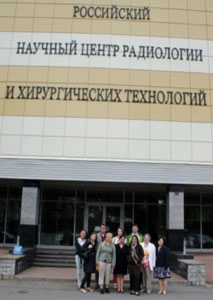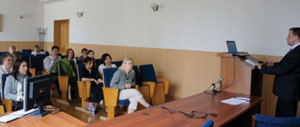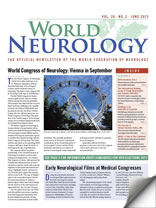
In June 2012, five Toronto residents visited St. Petersburg, Russia, here seen accompanied by Russian residents and Natalya Shuleshova, coordinator of the NIRVE program at the State Pavlov Medical University in St. Petersburg.

During exchange visits, residents from both hosting and visiting sites participate in various lectures and discussions.
The Neurology International Residents Videoconference and Exchange (NIRVE) is a resident initiative funded by the Peter A. Silverman Global e-Health Program, Canada International Scientific Exchange Program (CISEPO) and Baycrest Centre for Geriatric Care, Toronto. NIRVE promotes international collaboration beyond political or geographical borders and health care infrastructures. Hosted by the Division of Neurology, University of Toronto and St. Michael’s Hospital, Toronto, NIRVE unites residents around the world through videoconference, forging strong professional relationships and friendships.
In 2008, Toronto’s Dalia Rotstein founded NIRVE. As a neurology resident, she modeled NIRVE after the international behavioral neurology rounds, which are sponsored by University of Toronto’s Division of Neurology, under the auspices of the Peter A. Silverman Global e-Health Program, CISEPO and Canadian Neurological Sciences Federation. American, Argentinean, Brazilian, Canadian, Chilean, Cuban, Israeli, Jordanian, Palestinian, Russian, South African, Spanish and Swiss (WHO) hospitals have participated in these rounds. Rotstein envisioned NIRVE as an opportunity for international dialogue while complementing local educational and professional development goals.
NIRVE started in October 2009. Its first members included ABC Foundation School of Medicine, San André, Brazil; State Pavlov Medical University, St. Petersburg, Russia; Jordan University of Science and Technology, Irbid, Jordan; and University of Toronto, Canada. With continuous member feedback, NIRVE grew and succeeded in strengthening its audience’s education.
NIRVE not only aims to facilitate exchange of medical knowledge, but to dissipate biases toward foreign cultures and allow understanding of the practice and delivery of medicine in different socio-economical systems. In June 2011, an exchange visit program was initiated. Residents from Brazil, Jordan and Russia traveled to Toronto for a one-week elective. In 2012, Toronto residents visited St. Petersburg, Russia. These rich experiences allowed hosts and guests to further appreciate health care delivery in the societies they serve.
NIRVE provided a platform for mentorship opportunities and leadership development. Many residents acting as local NIRVE coordinators became chief residents and faculty members. Through NIRVE, they developed skills to become educators in their own right.
Currently in its third year, NIRVE continues to expand as an active international forum and to welcome new connections. Though Jordan and Chile have had to bid farewell to NIRVE, it recently welcomed Ethiopia’s Addis Ababa University, Canada’s Memorial University and France’s Centre Hospitalier Universitaire de Grenoble. Rounds continue on the first Thursday of each month, with a case presentation by a resident from a participating country. Audience members answer knowledge-testing questions as the case unfolds. A short “Image Challenge” section follows, with discussion of a neuroradiology or neuropathology case distributed prior to rounds.
Jenny Tsai took over NIRVE’s leadership in 2011. She was assisted in this capacity by her resident colleague, Olga Finlayson, who was succeeded by Mary Jane Lim Fat in 2012. As current leaders of NIRVE, Tsai and Lim Fat incorporate a global and public health component to its curriculum. NIRVE continues to enrich the education of future neurologists and bridges distances for better knowledge transfer in the world of neurology.
If your neurology residency program is interested in learning more about NIRVE, contact nirve.utoronto@gmail.com.
Mary JaneLim Fat is a first-year resident in the adult neurology residency program of the University of Toronto. Jenny P. Tsai is a fourth-year resident in the adult neurology residency program of the University of Toronto. Tim Patterson is in the Department of Telehealth, Baycrest, Toronto; vice chair, Canada International Scientific Exchange Program; adjunct professor, Al Quds University, Abu Deis, West Bank and York University; and telehealth consultant, Jordan University of Science and Technology. Mark Kinach is in the Department of Telemedicine, St. Michael’s Hospital, Toronto. Morris Freedman is in the Department of Medicine, Division of Neurology, Baycrest, Mt. Sinai Hospital, and University of Toronto, at the Rotman Research Institute, Baycrest, Toronto, Canada, and a member of the WFN Education Committee (co-chair, eLearning Task Force), Jenny Tsai and Mary Jane Lim Fat would like to acknowledge the continuing mentorship from Marika Hohol and Morris Freedman, Division of Neurology, University of Toronto and the tireless assistance of NIRVE’s technical team led by Tim Patterson from Toronto’s Baycrest Hospital, Mark Kinach from Toronto’s St. Michael’s Hospital and Simon Fortin from Resolve Collaboration.
